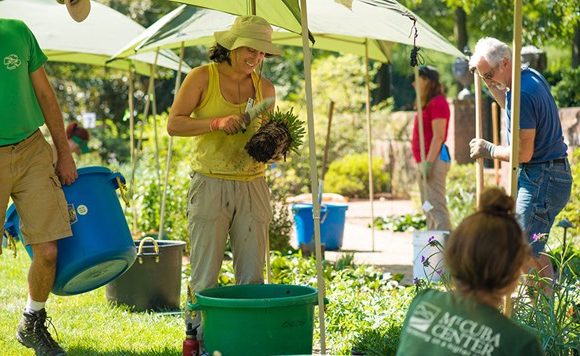Four Tips to Garden with the Environment in Mind

(GLOBE NEWSWIRE) — Gardens and home landscapes provide beauty and essential food and shelter to many ecologically valuable species like monarch butterflies and bluebirds. To increase the environmental value of a home landscape, gardeners can commit to using ecological methods of cultivating beautiful plantings. Here are four steps to getting started with ecological gardening:
1. Get to know the lay of the land
Begin by taking a good look at the garden area. Observe the way the elements affect it. Note which spots are shaded, which are sun-beaten and which seem to stay soggy long after the rain has stopped. Knowing these things makes selecting appropriate plants easier.
2. Consider the garden’s role in your life
Think about the intended use of the garden area. Whether the garden will be a place of relaxation or activity will determine the layout of paths and the types of plants to include. A child’s play area has different needs from a fire pit or dog run. Spots in the garden that will see high amounts of traffic should have plants that spring back after getting stepped on. Areas where children or pets will play should not have plants with many thorns, or poisonous fruits.
3. Right plant, right place
Beautiful landscapes can be achieved by “going with the flow” and installing plants that will thrive in the existing sun and soil conditions. Native plants are specifically adapted to the naturally occurring conditions in the area. They will thrive and support local ecology while adding beauty to the garden. Selecting site-appropriate plants can be made easy by heading to a native plant nursery or native plant sale.
4. Learn from the experts
There’s a lot to learn when it comes to creating a beautiful garden — sometimes it’s best to go right to the experts. Many educational opportunities present themselves through local botanical gardens and garden centers. At Mt. Cuba Center, a botanical garden in northern Delaware, students can hone their skills with the Ecological Gardening Certificate Program, a structured study that illuminates the many ingredients to creating a beautiful, ecologically functional landscape through a series of classes. A foundational course, the Fundamentals of Ecological Gardening, begins on Wednesday, June 1 at 10 a.m.
To register, visit http://bit.ly/1TKQM7D or browse course listings at mtcubacenter.org/education Mt. Cuba Center is a botanical garden that inspires an appreciation for the beauty and value of native plants and a commitment to protect the environments that sustain them. Mt. Cuba Center’s gardens are open to visitors Wednesday to Sunday, 10 a.m. to 4 p.m., April through October. For more information, contact Sara Levin Stevenson, Manager of Public Engagement at [email protected] or visit www.mtcubacenter.org.
Dr. Ronald Holmes is the author of 13 books: Jacob’s Dream! A Story of Bullying in School and Ways to Stop it. Jacob’s Dream! “A Lesson on Numbers and Birds,” “Jacob’s Dream! A Lesson on Alphabets and Continents,” “How to Eradicate Bullying,” “Education Questions to be Answered,” “Current Issues and Answers in Education,” “How to Eradicate Hazing,” “Professional Career Paths,” “Your Answers to Education Questions,” “How to revitalize the National Baptist Convention, USA, Inc.” “Completing the Dissertation: Tips, techniques and real-life experiences from Ph.D. graduates.” “Jacob’s Dream, A Story of Careers for Children” and Jacob’s Dream, A Story of Animals in Africa. He is publisher of “The Holmes Education Post,” an education focused Internet newspaper. Holmes is a former teacher, school administrator and district superintendent. He can be reached at [email protected]

